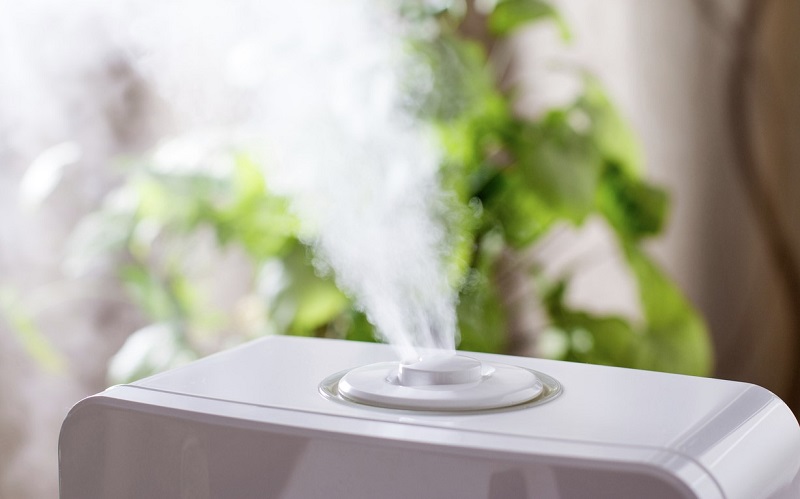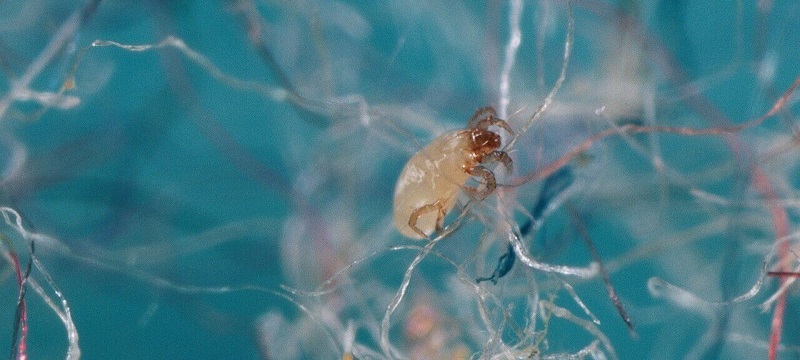A humidifier helps to increase a room’s humidity level by releasing steam or water vapor into the air.
They use different techniques to do this, the most common being vaporization and evaporation. Humidifiers can therefore regulate the moisture content in a room or the entire home.

Humidifying the air can be advantageous for adults and children who suffer from cracked, dry skin and nasal passages and allergic conditions such as asthma ad bronchitis.
This occurs mainly in the winter due to insufficient moisture in the air. They are also good for use around dogs, among other pets.
Contents
Do humidifiers make rooms less dusty?
Although humidifiers do not eliminate dust, they help reduce the airborne quantity of dust in your home.
Humidifiers don’t accumulate dust actively, but they still indirectly affect the dust particles.
Dust hangs in the air for a long time because it is super light. Humidifiers clean the air of dust by increasing moisture in your room, which soaks these airborne dust particles, making them heavy and hence unable to remain suspended.
Do humidifiers improve air quality?
When used correctly, humidifiers can make your home’s air more comfortable for your skin and respiration.
However, during spring, the air becomes dry, and a lot of pollen can worsen allergic conditions.
The EPA (Environmental Protection Agency) recommends home’s humidity be somewhere between 30 and 50%.
If it’s below 30%, the air becomes too dry and can lead to problems such as dry skin and chapped lips.
Also, too much moisture in the air can trigger dust mites and molds, which lead to allergic conditions. Setting humidifiers at the correct level will help balance the humidity in the air, leading to better air quality.

The presence of dust in your home is inevitable, but airborne dust particles are the most dangerous for you.
By reducing the quantity of dust suspended in the air, a humidifier improves the air quality by lessening the number of contaminants you inhale into your lungs.
This leads to decreased allergic reactions, flu, and cold symptoms. You’ll also have healthier lungs.
Does an air purifier help with dust?
Air purifiers combine a fan and an internal filter to pull dust particles from the air in a certain room.
The purified air is then released back into the room. This filtration process is repeated over and over hence resulting in cleaner air.
The air purifiers are designed to attract and eliminate contaminants, dust particles, and allergens and fight mold and odors.
This can be very beneficial for children and adults who suffer from asthma and allergies.
Can you use a humidifier for dust mites?
Dust mites are tiny microorganisms related to the spider family and exist in house dust. They feed on dead skin regularly shed by people and their pets.
Dust mites thrive in an environment with a humidity range of 70 to 80%, although they can survive in all climates.

Humidifiers do not eliminate dust mites, but they can be advantageous in controlling your space to avoid infestation of dust mites.
A humidifier can measure the humidity level in your home at a given time. You can use that to ensure the humidity levels don’t exceed the recommended 50%, which is favorable for dust mites.
If you want to remove dust mites from the air, you are better off using an air purifier with an appropriate filter.
Are dust mites harmful?
Dust mites are harmless most of the time and do not cause diseases. However, they and their excretion can trigger allergic reactions in people, especially asthmatics.
Signs of allergy to dust mites include but are not limited to sneezing, runny nose, eczema, cough or hay fever, red or watery eyes, asthma, and difficulty breathing.
How do you know if you need a humidifier?
You can use simple signs to determine whether you need a humidifier indoors. First is if your skin feels dry and itchy.
The low humidity level in your home causes your skin to crack and become itchy. A humidifier will address these problems better than lip balm or lotion.
Another sign is nose bleeds and nasal congestion. Low humid air can cause drying of the nasal passages leading to congestion which causes nose bleeding. Dry air can also worsen asthma and other respiratory-related problems.
Wrap up
In summary, humidifiers do not get rid of dust directly. However, they can help make your room less dusty by soaking dust particles that become heavier and cannot be suspended in the air.
Also, air purifiers pull dust particles and other contaminants from the air improving its quality. Finally, air humidifiers help maintain the correct humidity level in your room because either too dry or too humid air is not suitable for your health.
